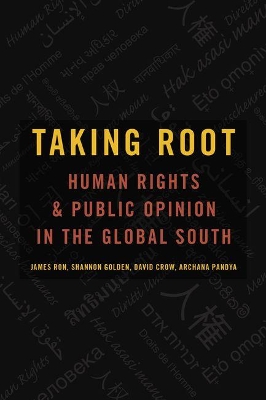Oxford Studies in Culture and Politics
1 total work
Human rights organizations have grown exponentially across the globe, particularly in the global South, and the term human rights is now common parlance among politicians and civil society activists. As international donors pour money into global human rights promotion, some governments, scholars, activists, and other critics fear a subtle, Western-led campaign for political, economic, and cultural domination.
While debates about human rights are waged in elite circles, what do publics in the global South think about human rights ideas and the organizations that promote them? Drawing on large-scale public opinion surveys and interview with human rights practioners in India, Mexico, Morocco, and Nigeria, Taking Root finds that most people are in fact broadly supportive of human rights discourse, trust local human rights groups, and do not view human rights as a tool of foreign powers.
Pro-human rights constituencies also tend to be highly skeptical of the U.S. government, multinational corporations, and their own governments. However, this general public support for human rights isn't grounded in strong commitments of public engagement, money, or local ties to the human rights sector. Publics in
the global South do donate to charitable causes and organizations, but rarely give to local rights groups. Rights organizations instead seek aid from foreign sources, an increasingly untenable strategy as foreign aid to civil society declines. The book also describes the complex relations between religiosity and support for human rights as faith communities, worldviews, and traditions strongly influence the public's views of human rights, but often in contradictory ways.
As the most informative and comprehensive account available of public perceptions of human rights across several regions of the world, Taking Root will challenge a number of accepted truths held by human rights supporters and skeptics alike.
While debates about human rights are waged in elite circles, what do publics in the global South think about human rights ideas and the organizations that promote them? Drawing on large-scale public opinion surveys and interview with human rights practioners in India, Mexico, Morocco, and Nigeria, Taking Root finds that most people are in fact broadly supportive of human rights discourse, trust local human rights groups, and do not view human rights as a tool of foreign powers.
Pro-human rights constituencies also tend to be highly skeptical of the U.S. government, multinational corporations, and their own governments. However, this general public support for human rights isn't grounded in strong commitments of public engagement, money, or local ties to the human rights sector. Publics in
the global South do donate to charitable causes and organizations, but rarely give to local rights groups. Rights organizations instead seek aid from foreign sources, an increasingly untenable strategy as foreign aid to civil society declines. The book also describes the complex relations between religiosity and support for human rights as faith communities, worldviews, and traditions strongly influence the public's views of human rights, but often in contradictory ways.
As the most informative and comprehensive account available of public perceptions of human rights across several regions of the world, Taking Root will challenge a number of accepted truths held by human rights supporters and skeptics alike.
